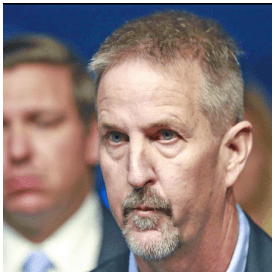
Is there a place in Florida that is more vulnerable to the effects of rising sea levels and the quality of water than St Augustine and St Johns County? With “resiliency” being the buzz word Historic City News reporters are hearing in both St Augustine and Tallahassee, one brand new administrator is excited about the possibility to reduce carbon emissions and reduce warming.
Not the unskilled patronage of a couple of civil engineers, a City Manager and his crony, neither of whom are qualified in the science, but rather a University of Florida professor who has a Ph.D. in biological sciences and who understands that water quality issues are “probably the most pressing problem in our state”.
“Climate change and sea-level rise are big issues for Florida. I think the governor recognizes that,” said the state’s first Chief Science Officer, Thomas Frazer. “Let me make it clear that climate change is a big problem that needs to be addressed and reducing carbon emissions is critical. That’s a message we have not heard out of the executive branch in Florida in nearly a decade.”
Governor Ron DeSantis created the position of chief science officer shortly after being sworn in; and, as of this week, Thomas Frazer is the first person to hold the job.
While St Augustine still struggles with the effects of “sunny day flooding” and poor stormwater systems that have not been properly maintained and upgraded, the destruction of the past three recent hurricanes has left areas like Davis Shores and others devastated.
St Augustine’s highest-paid city manager, John P. Regan, P.E., and his appointed Chief Resilience Officer, Michael G. Cullum, P.E., are putting a Band-Aid, at best, on an ever more dangerous problem that potentially leaves the city sewer treatment stations underwater and residents without the ability to flush their toilets. Measures must be in place to combat the flow of excess nutrients into waterways from stormwater systems, septic tanks, sewer lines, and agricultural runoff. Men like Frazer have the education and skills to address these realities while Regan and Cullum are so far out of their league that it is laughable.
Chief Science Officer Frazer recently spoke about the need to reduce nutrient pollution that is contributing to water quality problems and reduce carbon emissions that are warming the planet.
“I have read congressional testimony that says climate change is real, and humans are responsible for it and ultimately we’re going to have to reduce carbon emissions to reduce warming and its effects,’” Frazer said. In addition to Frazer as Chief Science Officer, DeSantis has appointed a chief resilience officer to help prepare the state for sea-level rise. Legislation has already been filed to establish a state Office of Resiliency within the governor’s office.
Discover more from HISTORIC CITY NEWS
Subscribe to get the latest posts sent to your email.




